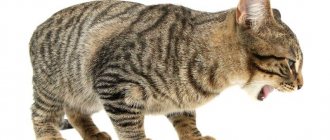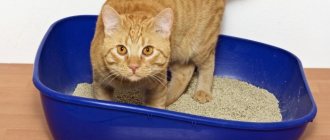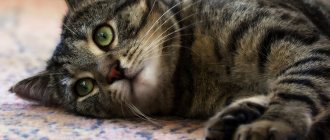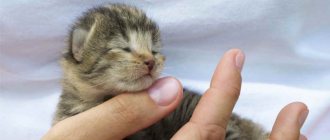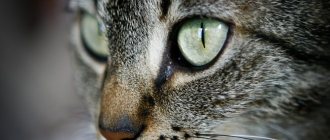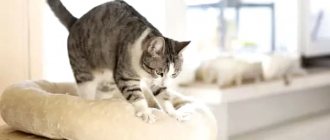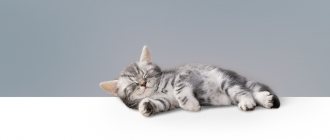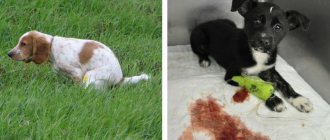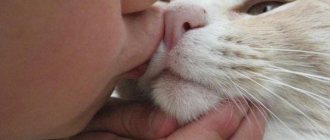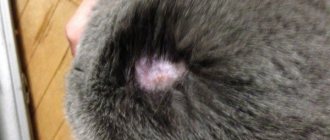Diarrhea (diarrhea) is an extremely unpleasant phenomenon for both the owner and the pet.
What causes this phenomenon, and what can be given to a cat for diarrhea, in what quantity, and whether you should rely only on yourself - all the answers to the questions. Diarrhea in a beloved pet, unlike other diseases, is difficult to see - even if the eyes fail, the nose will clearly indicate that something is wrong with the animal.
You shouldn’t panic when you find liquid feces; you need to figure out what caused the foul-smelling disorder and what to give your cat for diarrhea to stop this phenomenon.
Acute attack of diarrhea
A small kitten runs to the litter box quite often - this is normal if the stool has a normal color, smell and consistency. Changes in food, imperfections in the gastrointestinal tract, physical or nervous “overload,” overheating or, conversely, hypothermia, the first day of vaccination – all this often leads to diarrhea in a cat.
The appearance of mucus, blood in the stool, and changes in density should alert the owner.
In an old cat, alternating constipation with isolated cases of diarrhea is an almost normal phenomenon associated with decreased intestinal motility due to age. Preventive advice from a veterinarian, correction of diet and nutrition, encouragement to do more physical activity and possible use of appropriate medications will help here.
In adult healthy animals, a short-term "stomach upset" called "acute diarrhea" is most common. Acute diarrhea begins suddenly, without external changes in the cat’s behavior.
Diarrhea with acute diarrhea does not have a pronounced, sharp putrefactive odor, and ends just as suddenly (in a day or two). This can be attributed to the natural cleansing of the intestines, characteristic of all types of living beings on Earth.
Chronic diarrhea (diarrhea), accompanied by the loss of large amounts of water from the body, flatulence, stench, discoloration of feces, blood clots and mucus in the feces, is dangerous for the animal because it can last for weeks or even months.
Drug treatment
To help your cat get rid of diarrhea, you can give special medications. But it’s better not to get carried away with them yourself. It is better to discuss any means with your doctor first. If similar situations have already arisen, it is worth keeping tablets and drops in your medicine cabinet in case of relapse.
Among the effective medications that a veterinarian prescribes to treat diarrhea are the following:
- Metronidazole. The medicine is strong and effective. Experts recommend using only under medical supervision. The drug is prescribed in case of infection with parasites. For long-term treatment.
- Activated carbon. This is a remedy that is in any home medicine cabinet and always helps with diarrhea. The tablets are safe for adult pets and pregnant cats. The dosage is determined depending on the weight of the animal.
- Smecta. The medicine has a neutral taste, so you can easily give it to your pet. The application is the same as in humans. The powder is diluted in warm water, drawn into a syringe and poured into the cat’s mouth. The medicine has no side effects, so you can safely give it even to a kitten.
- Entorosgel. Another drug that is included in the list of essential drugs is extremely popular. It is used not only for diarrhea, but also in case of other irritations from the gastrointestinal tract or as a preventive measure.
Chronic diarrhea - secretory diarrhea
People say about secretory diarrhea: “like a clove” or “just water.” If a person with chronic diarrhea experiences pain, dizziness, weakness, nausea and dry throat, then rest assured that your cat is not feeling any better.
Changes in intestinal function occur due to impaired absorption and transport of water through its lumens. The water necessary for organizing the normal functioning of all body systems is simply excreted through copious loose stools. Rapid dehydration occurs, which can lead to the death of the animal.
Defecation with secretory diarrhea is painless, but brings only short-term relief, quickly replaced by pain due to accumulating gases and painful spasms.
Attention!
If watery stools turn brown-green or become deep yellow (to orange), this indicates a decrease in the contractile functions of the bladder walls and the absorption of bile secretions - hologenic diarrhea.
The appearance of white stool directly indicates the degeneration of liver tissue: jaundice, cirrhosis and cancer.
Bilirubin not processed by the liver provokes pathology of the intestines, expressed in random attacks of diarrhea, which owners mistake for an acute variant and try to find “the best cure for diarrhea for cats, because THIS no longer helps!”
Symptoms
Many owners often do not pay attention to their pet’s stool, but this is in vain, because sometimes serious disorders can occur, which as a result can lead to serious problems with the animal’s health.
The most important and obvious symptom of diarrhea is frequent loose stools. But besides this, other signs may also be observed:
- frequent attempts to defecate;
- manifestations of flatulence;
- the presence of mucus and blood in the stool.
Secondary symptoms can also often be observed:
- weight loss;
- lack of appetite;
- dehydration;
- manifestations of fever;
- the pet may be constantly lethargic and tired;
- gagging.
Important! If a cat has diarrhea with an uncharacteristic color, for example, black or green with impurities of blood and mucus, then in these situations you need to immediately visit a veterinarian. These signs may indicate the presence of a serious illness, and the slightest delay can lead to unpleasant consequences.
What else causes diarrhea?
Dysbacteriosis intestinal microflora caused by:
- taking medications such as antibiotics, diuretics, cardiotonic and myasthenic drugs, sedatives;
- dietary disturbances and nutrient imbalances;
- poisoning with toxins of organophosphorus compounds and insecticides, for example, when deworming or removing lice, carrying out repairs, eating spoiled foods, etc.;
- strains of pathogens of infectious viral and bacterial diseases.
Diarrhea can begin with acute intestinal infections that disrupt or paralyze the gastrointestinal tract, accompanied by dysbacteriosis, bloating, spasmodic pain, vomiting, temperature fluctuations, and a general depressed state of the cat. For example, gastritis.
Gene mutation, which often goes hand in hand with the breed of the animal, provokes a number of hereditary diseases, including secretory pathology, such as imperfection of transport proteins of the intestinal walls. In this case, the kitten has had diarrhea from the first day of birth, it is impossible to stop the development of the pathology, and the question is: “What can you give a cat for diarrhea?” - makes no sense. It is impossible to cure a hereditary disease; you can only adjust the composition of the food and take special medications in order to prolong the cat’s life as long as possible.
Many cat diseases, which are characterized by such a phenomenon as diarrhea, can become chronic.
Such diseases include:
- catarrhal gastritis;
- peptic ulcer;
- enteritis;
- parenchymal hepatitis;
- colitis;
- inflammation of the bile ducts and gallbladder;
- terminal ileitis;
- some infectious diseases, after which the cat remains a lifelong virus carrier.
Loose stools can be caused by “invisible killers” - growing tumors (hormone-producing) that are difficult to identify until they become visible to the naked eye or with a high-quality veterinary examination.
A lack or excess of vitamins and minerals also leads to gastrointestinal disorders - diarrhea in cats, changes in the skeletal system and perversion of appetite.
Infection with worms - helminthiasis - causes frequent disruption of normal bowel movements.
Giardiasis is the cause of chronic diarrhea in cats.
Attention! Giardia is not helminths or bacteria! This is a special unicellular parasite Giardia (lat.), the expulsion of which is possible only with antiparasitic agents.
A person communicating with a Giardia-infected cat is at risk!
An allergic reaction and a reaction to stress or nervous overstimulation may include excessive urination and acute diarrhea.
What to give a cat for diarrhea in each specific case depends on the correct diagnosis of diarrhea.
When you need a doctor
Since intestinal disorder is not a disease as such, but only a cause-and-effect symptom of the disease, you need to learn to understand the symptoms.
Normal stool for a cat of any age appears in the tray no more than 2-3 times a day.
It should not have a disgusting odor, be excessively hard (pellets) or liquid-mushy.
The stool should be an acceptable color ranging from tan to all dark shades, but should not be black or off-white.
Excessively loose, frequent stools, mixed with mucus or blood, and with a strong, nauseating odor, are the first “bell” that your cat needs treatment. The doctor must ensure the quality of treatment!
Additional "bells"
If loose stools appear, be sure to observe the cat.
If:
- Diarrhea is accompanied by vomiting;
- The cat often and forcefully licks its sides and belly;
- Sits hunched over, head down to front paws;
- Moans when changing position;
- Shortened, careful movements appeared;
- Does not respond to favorite food;
- Drinks water often and greedily;
- Reacts aggressively to attempts to pick him up;
- Tries to find a place in the shade and coolness;
- Urinates on himself;
- He falls on his side, throwing his head back.
Don't hesitate! Call the vet immediately: “The cat has diarrhea! What to do? What to give before your arrival? Step by step, please!
The doctor should receive all useful information from you:
- Age and sex of the animal.
- When and with what was the pet dewormed.
- When and what was vaccinated?
- Feeding regimen and what kind of food.
- What was treated for and with what (if any).
- Were antibiotics administered?
- When did the illness begin?
- When did the diarrhea start?
- What changes in the animal’s well-being have occurred over the last hour or two.
Your pet’s life is in danger, so do not hesitate to describe all the symptoms of the disease to the doctor in detail, including the color and quality of feces.
If the cat does not have such obvious signs of serious illness, then you can alleviate the symptoms of diarrhea using home methods.
Diet food
If you notice your cat has loose stools, what should you do first? It is necessary not to feed the animal anything for one day. But water should be given in large quantities. It will need to be boiled and cooled to room temperature.
While the animal is experiencing problems, it is not given any types of dairy, fermented milk products, fatty meats, or starchy foods. After one day, the patient begins to be fed in small portions. The norm is reduced by half, offering the sufferer low-fat food that is easily digestible.
The therapeutic diet involves split feeding 3-4 times a day. Prescribed medications are added to food in crushed or diluted form. Foods recommended for the disorder include:
- cooked white rice;
- boiled chicken meat without skin;
- boiled egg yolk.
Moist canned food for animals, specially designed for problem cases, are well absorbed and have an effect on the patient’s body. They do not have an irritating effect on the mucous walls of the gastrointestinal tract. It is allowed to return to the usual diet only after the mustachioed friend’s health has been completely restored.
What can you give a cat for diarrhea?
Of course, first of all, it is necessary to alleviate the general condition of the animal, because in any case the cat experiences pain and discomfort in the stomach and intestines. To eliminate cramps and flatulence, a semi-starved diet without water restriction is useful for the animal.
A kitten will have to fast for up to six months for 12 hours, an adult animal – 24 hours, an elderly cat – no more than 16 hours.
The water should NOT be warm or cold - room temperature.
The spasm is relieved by subcutaneous administration of atropine, ephedrine, analgin, promedol, novocaine, baralgin or their analogues, after consulting with a doctor about the doses and time of administration of the drug.
It is useful to give chamomile infusion, a slightly pink solution of potassium salt of permanganate acid (potassium permanganate), and essential valerian tincture internally (orally).
Despite diarrhea, a cleansing and disinfecting enema is desirable.
To stop frequent bowel movements for a cat, the following are applicable:
- activated carbon diluted in a small amount of water – ½ tab. 2 r/day;
- decoction of oak bark or rice chaff – 5 ml. 3-4 r/day;
- potato starch – 1 tsp. for ½ glass of water 2 times a day, 2 “cubes”. The solution must be mixed before each use!
- blueberry decoction – 3 tbsp. for 1 glass of boiling water (leave for at least 2 hours);
- Smecta (1 sachet per 100 ml of warm water) – teaspoon 3 times a day;
- Enterosgel, diluted 1 cm of paste x 5 ml. warm water - twice a day.
Preparations that contain prebiotics, synbiotics and probiotics (bifidobacterin and lactobacterin) have proven themselves to be excellent.
Suitable:
- Linux;
- Enterol;
- Bifiform;
- Acipol;
- Acylact;
- Hilak;
- Bifidumbacterin.
A cat cannot weigh like a human, so we divide all doses of human medications by 4 and only after that we feed the pet through a syringe without a needle.
Excellent veterinary diarrhea medications for cats:
- By the wind (1-3);
- EnteroZoo;
- Pro-Colin lactobifide;
- Veracol;
- Sporobacterin;
- Normoflorin;
- Stimbifid (for breakthrough diarrhea)
Carefully! Each of the listed drugs has a strong effect, and they cannot be taken at the same time!
And further. If, after all the steps taken, the cat’s diarrhea cannot be stopped within 4 days (2 days for a kitten), go to the clinic.
The animal may need additional therapy in the form of droppers and sulfonamides if the cat’s diarrhea is a consequence of damage to the intestinal walls, disruption of the digestive organs, endocrinological tumors in the adrenal glands, and other serious disorders. This cannot be done without thorough clinical and laboratory diagnostics!
Diet and prevention
After completing the course, you should take care of the proper nutrition of your pet.
In addition to drugs that improve appetite and stimulate the secretion of intestinal glands, the cat should receive gentle, easily digestible food low in fat and salt. Boiled chicken parts and rice in chicken broth are a good solution.
We feed fractionally - 5-6 mini portions throughout the day, like a kitten.
No sweet, spicy or seasonings. Pieces from the common table are unacceptable, no matter how the sly man begs for them!
Vet Diet Purina EN is a well-balanced food, ideal for restoring an organism weakened by diarrhea. In the first days it is better to give a canned “soft” version.
What can you give a cat for diarrhea if he has allergies?
First of all, DO NOT give those foods to which the cat reacts with diarrhea. Testing your pet's blood for allergens will help you. After receiving the results, you will have to change the cat’s diet forever. The test results will tell you what to exclude from your diet.
A sharp jump in allergies is possible when switching to a new food unfamiliar to the cat’s body. You need to introduce “new things” gradually, no matter how much you want to quickly feed your pet something healthier and tastier (in your opinion).
If a cat’s stomach is upset after a new meal, it is recommended to give Enterosgel (0.5 ml/kg body weight) or Smecta once.
What to give a cat for diarrhea if he is nervous?
Nothing! All cats are extremely emotional animals, although they hide it under the guise of indifference. A stressful situation can cause them to have diarrhea. The owner’s task is to eliminate the stress factor or reconcile the pet with it.
After the nervousness is eliminated, the diarrhea will stop on its own - the resulting nervous reaction is reversible.
As a sedative you can give:
- cat Baiyun;
- Fitex;
- Stop stress;
- Calm Aid.
All drugs are herbal remedies, so they cannot harm the cat’s health unless the animal is allergic to their components.
Loperamide or Levomycetin - a cure for diarrhea for cats?
Drugs such as Loperamide (Lopedium, Imodium, Suprelol), Levomycetin, Phthalazol, Tetracycline and Furazolidone will certainly have an effect on indigestion and on the cat's intestines. However, they must be used with extreme caution if it is not possible to use other medications. The single dose is minimal - 10 times less than for humans.
How to help a cat yourself
There is no need to panic at the first sign of an upset stomach in your cat. You can try to stop diarrhea with your own remedies. The following methods can help normalize digestion:
- Deworm the animal, especially if it has not been done for more than three months. Often this measure helps solve the issue of normalizing digestion if the problem is a helminthic infestation.
- If there is a suspicion of poisoning, you should give the cat sorbents - activated carbon, Enterosogel, Smecta.
- An unfavorable reaction to a change in food can be eliminated by eliminating the new product from the animal’s diet.
- In case of allergies, you can alleviate your pet’s condition with the help of antihistamines - Diphenhydramine, Diphenhydramine. If the reaction is caused by the flea collar, it must be removed.
- If the animal has diabetes, then diarrhea may be caused by a violation of the diet. You should establish proper nutrition for your pet and follow all doctor’s orders on time.
- A cat with diseases of the liver, kidneys, or gall bladder should be kept on special dry or wet food until contacting a doctor.
- If you suspect that indigestion is caused by hairballs, you should give your pet a special paste to remove them.
- For intestinal diseases, a special diet (gastrofeed) will help. If the stool does not return to normal within a few days, you can use tablets from a “human” pharmacy - Ftalozol, Enetrofuril, Furazolidone. You just need to remember to follow the dosage.
- In all cases of indigestion, the animal should receive as much fluid as possible and a special diet. Sometimes a wet fast for up to forty-eight hours (for adults) helps.
- If dehydration is suspected, a subcutaneous infusion of Ringer's solution, Ringer-Locke solution, glucose with vitamins B and C will help.
Prevention of diarrhea
In order not to worry about what to give your cat for diarrhea if he is already sick, you need to follow basic hygiene rules for keeping pets:
- monitor the general condition of the cat;
- do not lose track of vaccinations and deworming;
- avoid interacting with unfamiliar cats (and you too!);
- monitor the quality of food;
- avoid stressful situations;
- wash your hands after cleaning the tray;
- Disinfect the tray and bowls with boiling water;
- carry out wet cleaning;
With attentive and responsible attitude towards your pet, all possible causes of diarrhea can be reduced to zero!
